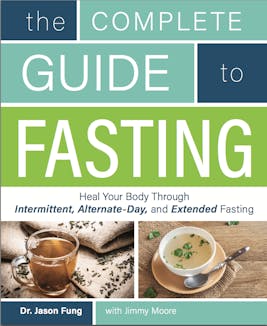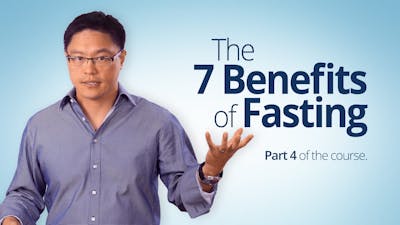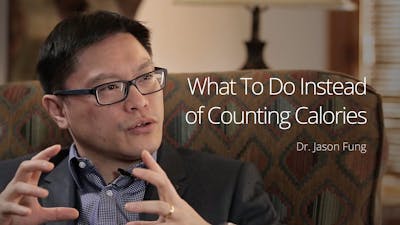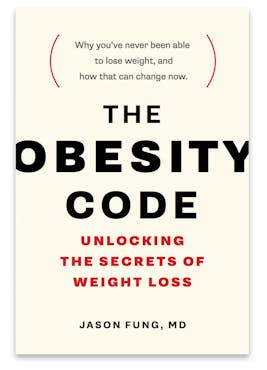How fasting affects your physiology and hormones
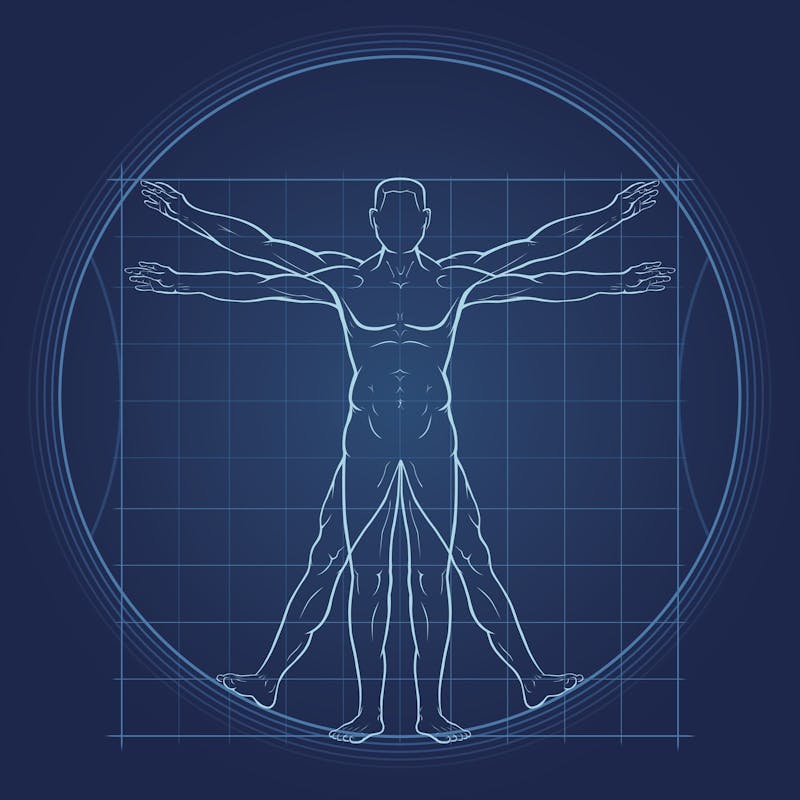
In order to fully understand fasting and its benefits, it is useful to review the physiology of what happens to our body when we eat nothing. Here’s a brief crash course.
Physiology
Glucose and fat are the body’s main sources of energy. Glucose is the most easily accessible fuel source for the body. However, if glucose is not available, the body can adjust by switching to fat metabolism, without any detrimental health effects.
This is simply a natural part of life. Periods of low food availability have always been a part of human history and mechanisms have evolved to adapt to this fact of Paleolithic life. The transition from the fed state to the fasted state occurs in several stages.
- Feeding – During meals, insulin levels are raised. This allows uptake of glucose into tissues such as the muscle or brain to be used directly for energy. Excess glucose is stored as glycogen in the liver.
- The post-absorptive phase – 6-24 hours after beginning fasting. Insulin levels start to fall. Breakdown of glycogen releases glucose for energy. Glycogen stores last for roughly 24 hours.
- Gluconeogenesis – 24 hours to 2 days. The liver manufactures new glucose from amino acids in a process called “gluconeogenesis”. Literally, this is translated as “making new glucose”. In non-diabetic persons, glucose levels fall but stay within the normal range.
- Ketosis – 2-3 days after beginning fasting. The low levels of insulin reached during fasting stimulate lipolysis, the breakdown of fat for energy. The storage form of fat, known as triglycerides, is broken into the glycerol backbone and three fatty acid chains. Glycerol is used for gluconeogenesis. Fatty acids may be used directly for energy by many tissues in the body, but not the brain. Ketone bodies, capable of crossing the blood-brain barrier, are produced from fatty acids for use by the brain. After four days of fasting, approximately 75% of the energy used by the brain is provided by ketones. The two major types of ketones produced are beta hydroxybutyrate and acetoacetate, which can increase over 70 fold during fasting.
You’ll notice that there is a period of time during gluconeogenesis (step 3) that protein is being used to produce glucose. Many have interpreted this to mean that the body is ‘burning muscle’ to provide glucose. This is not actually what happens. During this period, excess proteins are indeed broken down for glucose. But this is not necessarily muscle. There are connective tissue, skin, old cells and other junky cell parts that can be destroyed. This is the process of autophagy, whose importance is just being realized.
Further, after this breakdown period, the body will rebuild any necessary proteins that were used up. This completes the cellular renewal cycle. It’s like renovating your kitchen. You can’t simply build old cabinets on top of new ones. You first need to remove to the old junky ones. So breakdown of old protein is necessary for renewal of cells. If you only focus on the breakdown, you will miss the entire beneficial renewal cycle.



The human body has well developed mechanisms for dealing with periods of low food availability. In essence, what we are describing here is the process of switching from burning glucose (short term) to burning fat (long term). Fat is simply the body’s stored food energy. In times of low food availability, stored food is naturally released to fill the void.
Burning muscle for energy would be like storing firewood for the winter and then chopping up your sofa and burning it as soon as the temperature drops, leaving all the firewood intact. Also, consider all those aboriginal peoples, inuit, native peoples who had repeated fast/ famine cycles. If they all burned muscle, wouldn’t they all be little balls of 100% fat? It’s funny how that didn’t happen.
Hormonal Adaptation
Insulin
Fasting is the most efficient and consistent strategy to decrease insulin levels. This was first noted decades ago, and widely accepted as true. It is quite simple and obvious. Almost all foods raise insulin, so the most effective method of reducing insulin is to avoid food. Blood glucose levels remain normal, as the body begins to switch over to burning fat for energy. This effect is seen with fasting periods as short as 24-36 hours. Longer duration fasts reduce insulin even more dramatically. More recently, alternate daily fasting has been studied as an acceptable technique of reducing insulin.
Regular fasting, in addition to lowering insulin levels, has also been shown to improve insulin sensitivity significantly. This may be the missing link in the weight-loss puzzle. Most diets reduce highly insulin-secreting foods, but do not address the insulin resistance issue. Weight is initially lost, but insulin resistance keeps insulin levels and Body Set Weight high. Fasting is an efficient method of reducing insulin resistance.
Lowering insulin rids the body of excess salt and water. Insulin causes salt and water retention in the kidney. Atkins-style diets often cause diuresis, the loss of excess water, leading to the contention that much of the initial weight loss is water. While true, diuresis is beneficial in reducing bloating, and feeling ‘lighter’. Some may also note a slightly lower blood pressure. Fasting has also been noted to have an early period of rapid weight loss. For the first five days, weight loss averages 0.9 kg/ day, far exceeding the caloric restriction and likely due to a diuresis of salt and water.
Growth hormone



It is precisely this growth hormone surge that complete the cellular renewal cycle. Long term studies of intermittent fasting prove that the fasting strategy is more than 4 times better at preserving lean mass percentage compared to caloric restriction.
Electrolytes
Concerns about malnutrition during fasting are misplaced. Insufficient calories are not a major worry, since fat stores are quite ample unless you are severely underweight to begin with. The main concern is the development of micronutrient deficiency. However, even prolonged studies of fasting have found no evidence of malnutrition.
Potassium levels may decrease slightly, but even two months of continuous fasting does not decrease levels below 3.0 mEq/L, even without the use of supplements. This duration of fasting is far longer than generally recommended. Magnesium, calcium and phosphorus levels during fasting are stable. Presumably, this is due to the large stores of these minerals in the bones. Ninety nine percent of the calcium and phosphorus in the body is stored in the bones.
The use of a multi-vitamin supplement will provide the recommended daily allowance of micronutrients. A therapeutic fast of 382 days was maintained with only a multivitamin with no harmful effect on health. Actually, this man maintained that he had felt terrific during this entire period. The only concern may be a slight elevation in uric acid that has been described in fasting.
Noradrenaline
Noradrenaline levels are increased so that we have plenty of energy to go get more food. For example, 48 hours of fasting produces a 3.6% increase in metabolic rate, not the dreaded metabolic ‘shut-down’. In response to a 4-day fast, resting energy expenditure increased up to 14%. Rather than slowing the metabolism, instead the body revvs it up. Presumably, this is done so that we have energy to go out and find more food.
This is really quite interesting. Fasting, but not low-calorie diets, results in numerous hormonal adaptations that all appear to be highly beneficial on many levels. In essence, fasting transitions the body from burning sugar to burning fat. Resting metabolism is NOT decreased but instead increased. We are, effectively, feeding our bodies through our own fat. We are ‘eating’ our own fat. This makes total sense. Fat, in essence is stored food. In fact, studies show that the epinephrine (adrenalin) induced fat burning does not depend upon lowering blood sugar.
Recall our previous discussion of how insulin works. There are two storage systems for food energy – sugar and fat. Sugar is glucose and chains of glucose (glycogen) in the liver. This is like your refrigerator. It’s easy to put food in and take it out, but there is limited storage space. Because it’s so much simpler to use, the body uses glucose first.
Fat is food stored away long term, like a freezer. It’s harder to put food into the freezer and take it out, but there is unlimited storage space. Our problem of weight loss, is how to clear out the freezer. If our body is always accustomed to burning sugar, it will not be able to access the fat stores. We then get hungry and want to eat to replenish the ‘fridge’. We are hungry, despite the fact that there is more than enough ‘food’ stored as fat in the ‘freezer’.
One solution is to simply empty out the fridge by fasting. This allows us to easily get into the food in the freezer and burn fat. Fasting provides an easy way in.
—
Jason Fung
More
Intermittent Fasting for Beginners
Popular videos about fasting
- MEMBERS ONLY
![The 2 big lies of type 2 diabetes]()
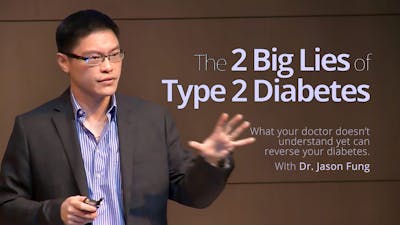
- MEMBERS ONLY
![The top 5 myths of fasting]()
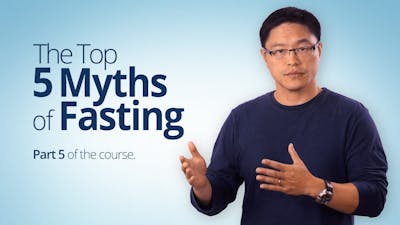
- MEMBERS ONLY
![The cause of obesity]()
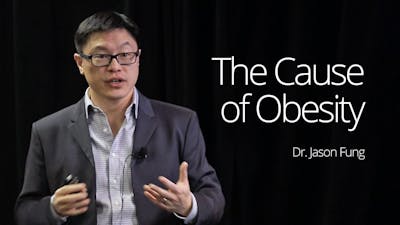
Earlier with Dr. Jason Fung
Why Fasting Is More Effective Than Calorie Counting
The Complete Guide to Fasting Is Finally Available!
How Does Fasting Affect Your Brain?
How to Renew Your Body: Fasting and Autophagy
Complications of Diabetes – A Disease Affecting All Organs
How Much Protein Should You Eat?
The Common Currency in Our Bodies Is Not Calories – Guess What It Is?
More with Dr. Fung
His book The Obesity Code is available on Amazon.
His new book, The Complete Guide to Fasting is also available on Amazon.
